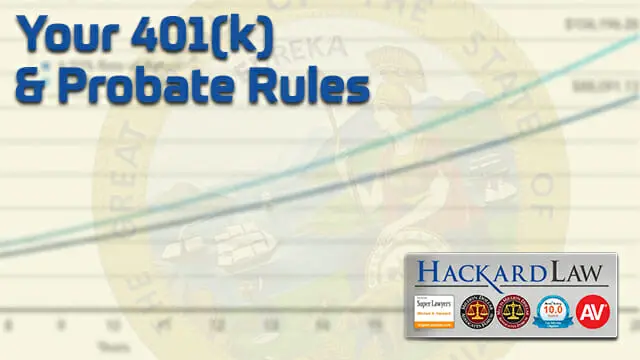
Will My 401(k) Funds Pass by Intestate Rules? | CA Probate Laws
We are sometimes asked “what happens to the funds in my 401(k) if I die without a will?” Will the named beneficiary of my 401(k) have difficulty in securing the proceeds of my 401(k)?
Let’s start with who is the beneficiary of a 401(k). Federal law mandates that if you are married, your spouse is automatically the beneficiary of your 401(k) or other pension plan. If you want to have someone other than your spouse the named beneficiary then your spouse must sign a waiver.
Such waivers generally include the following factors:
- Identification as the spouse of the 401(k) participant.
- Consent to the participating spouse’s designation of beneficiaries.
- Acknowledgement that the participating spouse’s designation of any other beneficiaries is not valid without your consent.
- Waiver of the right to be sole primary beneficiary of the 401(k) plan.
- Your consent is irrevocable until the participating spouse changes designation of beneficiaries.
- At that time you must consent to any change in beneficiaries.
- Your spouse may change beneficiaries without your consent.
Such waivers are dated, the place of execution stated, and signed by the 401(k) participant’s spouse. The forms are generally notarized and the signature of the Authorized Representative of the Plan Administrator is provided for. Companies have different forms and a participant wanting to have a beneficiary other than his or her spouse will need to request a 401(k) Beneficiary Designation Form from the plan administrator.
Other assets not subject to intestate succession include: Property transferred through a living trust; Life insurance proceeds; IRA and other retirement accounts; Securities held in a transfer upon death account; Payable on death accounts (PODs); and property held in joint tenancy.
If you are dealing with issues related to 401(k) succession rules and you want to speak with a California counsel about the rules, call us at Hackard Law. (916) 313-3031.

 (916) 775-8542
(916) 775-8542